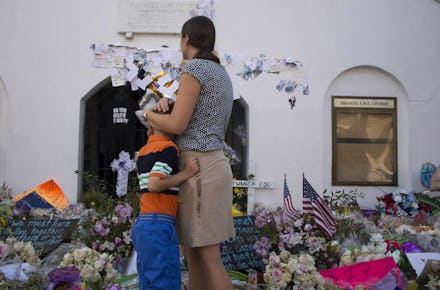On Using White Womanhood to Justify Racism and White Terrorism

Journalists and editorialists have spilled much ink in the last week to discuss whether we should call Dylann Roof a terrorist, or if we should blame racism and gun laws for his crimes. The New Republic's Rebecca Traister reminds us, quite poignantly, that our racist history isn't back to haunt us, because it never left us. But we must also consider that part of Roof's terrorist act is grounded in a racism built on the backs of black men and women to protect white womanhood.
When Dylann Roof shot nine congregants, six of whom were women, at Emanuel African Methodist Episcopal Church in Charleston, South Carolina, on June 17, he had been contemplating his own racist motivations for some time, as evidenced by his widely circulated manifesto. After he sat in the church pews for an hour, welcomed by black women and men to their Wednesday worship service, he crystallized his screed into a centuries-old justification: "You rape our women."
I know that Roof included me in this "our" of his. But I also know this: Roof didn't shoot the Charleston Nine on my actual, lived white female behalf. I'm not having it. If we consider the brutal murder of Emmett Till, killed for allegedly whistling at a white woman, or the Ku Klux Klan's historical justification of lynching black men to "protect" white women, we can see how sexism and racism make white terrorism not only possible but also viable in the 21st century. And I know — even though too many of my white, female, feminist, contemporaries have been relatively and resoundingly silent in light of this terrorist act — I stand on the shoulders of other white women who rejected the shedding of black people's blood in their names, too.
These are women like Jessie Daniel Ames and Anne Braden, whose anti-racist, feminist mission was to upend racism in the name of white womanhood.
In 1930, after years of work with Methodist women's groups and woman suffrage activism in her home state of Texas, Ames founded the Association of Southern Women for the Prevention of Lynching. Understanding that lynching was an indefensible and hateful crime against humanity, she acknowledged openly that "lynchers and mobsters" claim "that they are acting solely in defense of womanhood." Ames refused to let "those bent upon personal revenge and savagery to commit acts of violence and lawlessness in the name of women," and sought to create a new public opinion in the South, one that would eradicate not only lynching, but also the racism and sexism that undergird it.
For 12 years, Ames and 40,000 signatories on the ASWPL pledge pushed for anti-lynching legislation in states across the Deep South, to no legislative success (although lynchings in Texas did go down). In 1942, the Association folded into the Commission on Interracial Cooperation, where Ames headed up the women's committee. Until her death in 1972, she pursued racial justice and rejected racism based on the fragility of white womanhood.
Too many white women have remained silent in the face of lynchings past and present, allowing them to occur through complicity that bolsters racism in our defense.
In Kentucky, Braden was also a leading anti-racist activist. In 1951, she was arrested after she organized a group of Southern white women through the Civil Rights Commission to travel to Jackson, Mississippi, to protest the execution of Willie McGee, a black man tried and sentenced to death for allegedly raping a white woman. Like Ames, she dedicated her life's work to upending racism, in part by rejecting the invocation of white womanhood to justify white racism. Braden always acknowledged that it is the responsibility of white people to confront and challenge racism. She died in 2006, and her legacy lives on in white people like me.
Both Ames and Braden knew that defending white womanhood by killing black bodies was morally and ethically repugnant. But they also knew that as white women, it was their responsibility to shatter the myths of Southern white womanhood that justified black death.
Fast forward to 2015. Dylann Roof kills nine people in a church because "you rape our women." And like days past, most white women have said nothing about this defense.
But if we listen to black women who have been theorizing about feminism as an understanding of the intersections of racism and sexism that shape their lives, we must confront and recognize how racism and sexism define our lives as well. Racist actions done in our name need to be identified and rebuked as such. Roof invoked me and all white women when he opened fire in Charleston. I stand firm that no one is allowed to use my body, my white womanhood, to justify white terrorism. Too many white women have remained silent in the face of lynchings past and present, allowing them to occur through complicity that bolsters racism in our supposed defense.
On Sunday, June 21, the Reverend Dr. William J. Barber II spoke at Greenleaf Christian Church in North Carolina, stating, "The perpetrator has been caught, but the killer is still at large." The killer is at large, in part, because we as white women won't stand firm against killings done and justified in our names. At this critical moment, we need to invoke the legacies of Jessie and Anne if we are going to undo racism in this century.